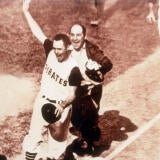Astros could make a push for Gerrit Cole, but they might have to trade Carlos Correa to make it happen
The Astros were reportedly one of the 'mystery teams' in on Cole
The bidding war for free-agent ace Gerrit Cole between the New York Yankees, Los Angeles Angels, and Los Angeles Dodgers is ongoing -- and it's getting interesting. On Tuesday Cole's agent Scott Boras introduced a wrinkle to the equation by suggesting there were other, undisclosed clubs involved -- "mystery teams," if you will. Our Dayn Perry tried to suss out who those clubs might be during the afternoon. As of Tuesday evening, one of the teams has been identified as the Houston Astros, who are "contemplating" if they should attempt to retain Cole, per Joel Sherman of the New York Post.
Obviously there's a gulf between "contemplating" and actively pursuing. We remain skeptical about the Astros' chances, however, because of the financial implications. Back in October, we noted that owner Jim Crane suggested he would prefer to avoid the luxury tax area. Doing so while retaining Cole appeared impossible; it appears even less possible now that his contractual parameters are coming into focus. To wit, the Astros have considered trading shortstop Carlos Correa to create additional budget room, per Ken Rosenthal of The Athletic. CBS Sports originally reported that executives expected the Astros to weigh trading Correa and/or George Springer earlier in the offseason.
As it stands, the Astros' payroll is projected to be around $204 million, per Cot's Contracts. Their CBT number, on the other hand, is around $222 million -- or $14 million over the threshold. Were Cole to sign for eight years and $300 million, his CBT number would be $37.5 million. That would push the Astros well beyond the highest penalty threshold, exposing them to various surtaxes and a lowered draft pick.
Moving George Springer (an impending free agent who might receive more than $20 million in arbitration) and/or Carlos Correa (around $8 million) would help reduce their CBT number. The Astros could also attach prospects to dump Josh Reddick and the $13 million remaining on his contract -- similar to what the Angels did on Tuesday with Zack Cozart. Trading some combination of Correa and an outfielder would free up between $21 to $28 million -- adding Cole would obviously negate those savings (and more), but not to the extent that the Astros would exceed the highest threshold.
The catch is that the Astros would be unable to make any other costly additions without further trades. That would be a problem, seeing as how they would still need to address their hole behind the plate, and add the customary reliever or two -- and that's under the assumption they would slide Alex Bregman to shortstop and insert Abraham Toro at third base, with Kyle Tucker taking over in the outfield. That's the most cost-effective solution, after all.
The Astros could try to trim their number more by moving the likes of Aledmys Diaz, Chris Devenski, and Brad Peacock -- that would free up nearly $10 million -- but every subtraction creates one more roster hole the Astros would need to patch without spending an equivalent amount of money. In other words, the Astros are going to find it difficult to sign Cole, field the best possible roster, and remain under that steepest portion of the luxury tax.
If Crane is willing to pay the price to retain an elite talent like Cole, then that would be a gamechanger -- and a welcomed development in a league that could use more like it. But it's fair to consider the Astros a long shot to retain Cole until Crane proves he has the stomach to go so deep into the luxury tax.


















